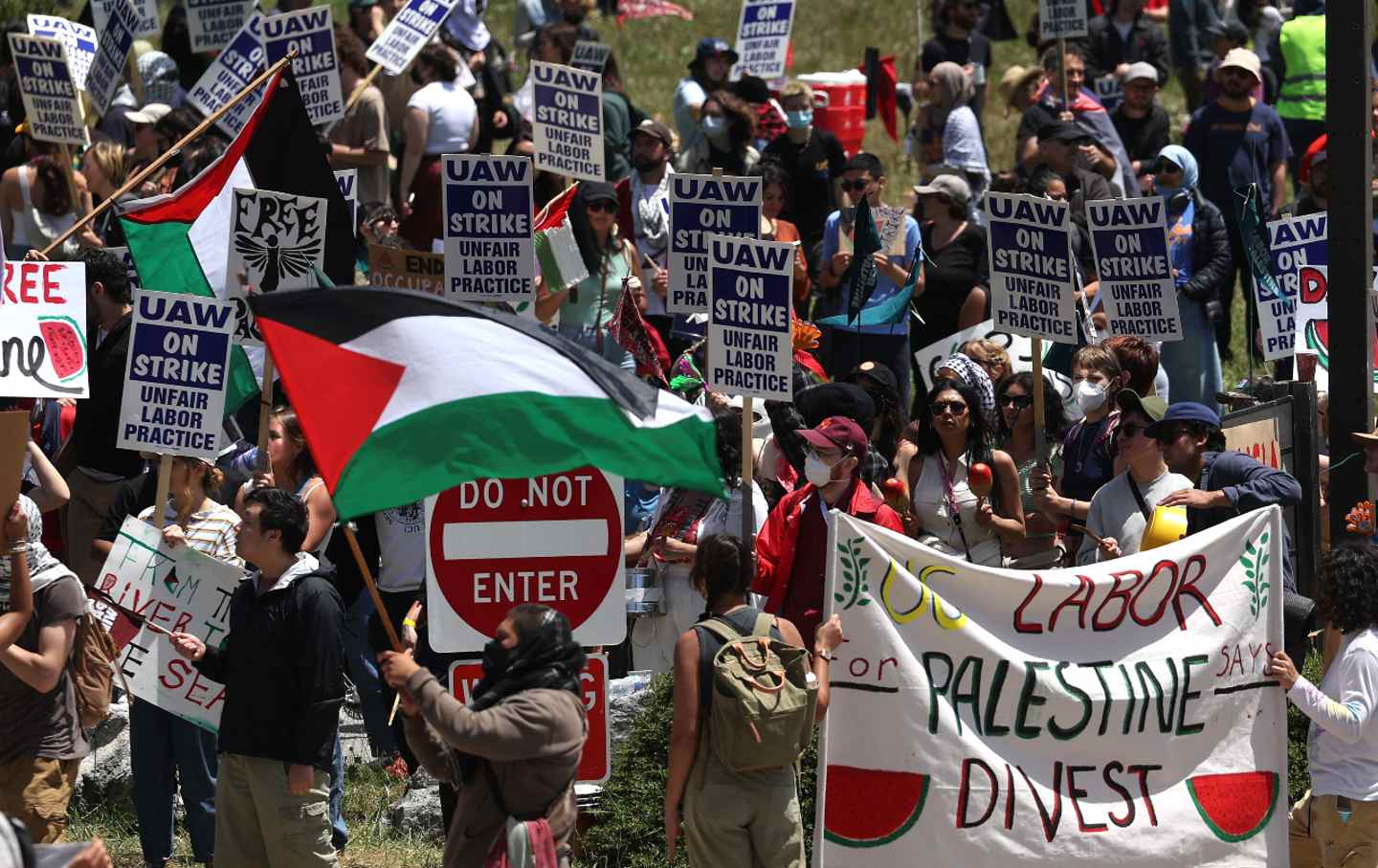The symbiotic relationship between universities and the military puts higher education workers in a position of significant structural power.

This spring’s university encampment protests represented a welcome step up in the Palestine solidarity movement. Now, as students leave campus for the summer, their activism is spawning a further escalation—one that holds tremendous promise for the US anti-war movement: worker strikes.
This week, 48,000 University of California (UC) workers—postdocs, graduate student researchers, and teaching assistants—began a rolling strike in response to the violent police crackdown on pro-Palestinian campus students and workers. On Monday, 3,000 union members at UC Santa Cruz walked out of classrooms and research laboratories and onto picket lines. Today, May 23, Union leaders announced that beginning next Tuesday, more than 10,000 workers at UCLA and UC Davis will begin to strike as well, and other workers in the 11-campus UC system will soon follow.
Mass anti-war street demonstrations seek to disrupt political discourse. But there are very few instances—at least in the United States—of workers wielding the strike weapon to disrupt the war economy. The UC strike could introduce a powerful new strategy to not just resist today’s US support for the Israeli war on the Palestinians but also challenge the US imperialist war machine in the years ahead.
Two factors will determine whether this new anti-war front succeeds: First, whether UC workers can persuade others to expand the strike strategy to more universities—and even other industries; and second, whether the workers can sustain strikes through the inevitable backlash, which will be particularly brutal precisely because opponents will properly see widespread strike action as a significant threat to their war plans.
The UC workers—members of UAW 4811—credit the student-led protests for inspiring their union to go on strike. Along with their peers across the country, UC students this spring began building encampments in solidarity with Palestine. The backlash from UC administrators mirrored the repression at Columbia University and elsewhere: mass, often violent arrests of students, graduate workers, and faculty at UC campuses in San Diego, Berkeley, Irvine, and most notoriously, in Los Angeles, where on April 30 police stood aside while a far-right mob attacked the peaceful encampment, shooting fireworks and pepper spray and beating pro-Palestinian students and workers with sticks. Just 24 hours later, as the protesters were recovering from the assault, police swept in and violently broke up the encampment, arresting 209 people.
“We watched our union siblings beaten by Zionist mobs while the university did nothing, at first,” said Jake Orbison, an English Department graduate student worker at UC Berkeley. Then, by “calling the cops to beat their students a second time,” the UC administration “politicized every UC campus,” Orbison said.
Last Wednesday, police from at least 23 different Orange County police departments assaulted the UC Irvine pro-Palestine encampment. They beat dozens of protesters, including History Department graduate student worker Mark Gradoni, who spent the night in jail alongside National Lawyers Guild legal observers, a journalist, faculty, and others who had been seized in the police riot. “It’s surreal to be at @UCIrvine, my workplace & intellectual home, to attend my friend’s dissertation defense and then be attacked, beaten, and jailed because members of our academic community hung a banner in the memory of the late [assassinated Palestinian human rights activist] Alex Odeh,” he tweeted the next day.
In the wake of the police crackdown, the UAW filed a series of unfair-labor-practice charges against the university, detailing how it violated the members’ legal and contractual rights when it attacked and arrested union members alongside others protesting peacefully.
The union demanded that the university provide amnesty for all protesting UC workers, students, and faculty; commit to the right to free speech and political expression on campus; divest from weapons manufacturers, military contractors, and companies profiting from Israel’s war on Gaza; disclose all funding sources and investments; and, most ambitiously, give research workers transitional funding to opt out of projects tied to the US military or oppression of Palestinians.
In a series of strike authorization votes last week,




















































